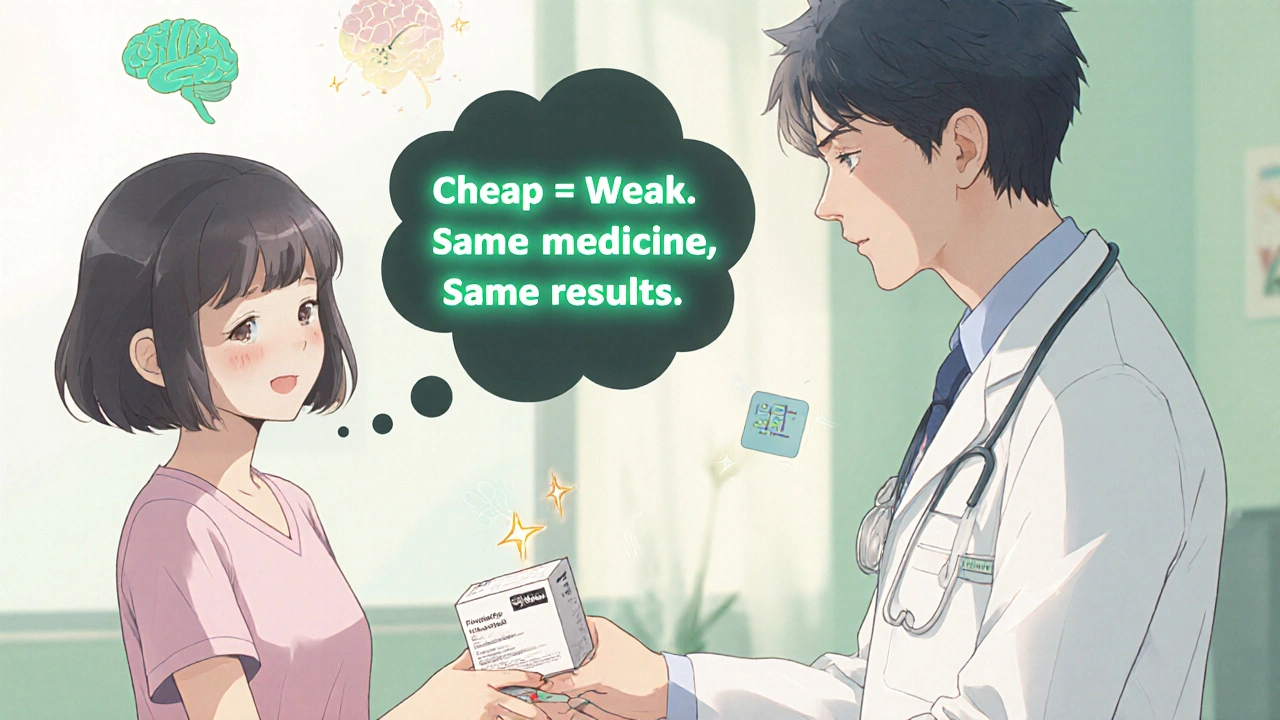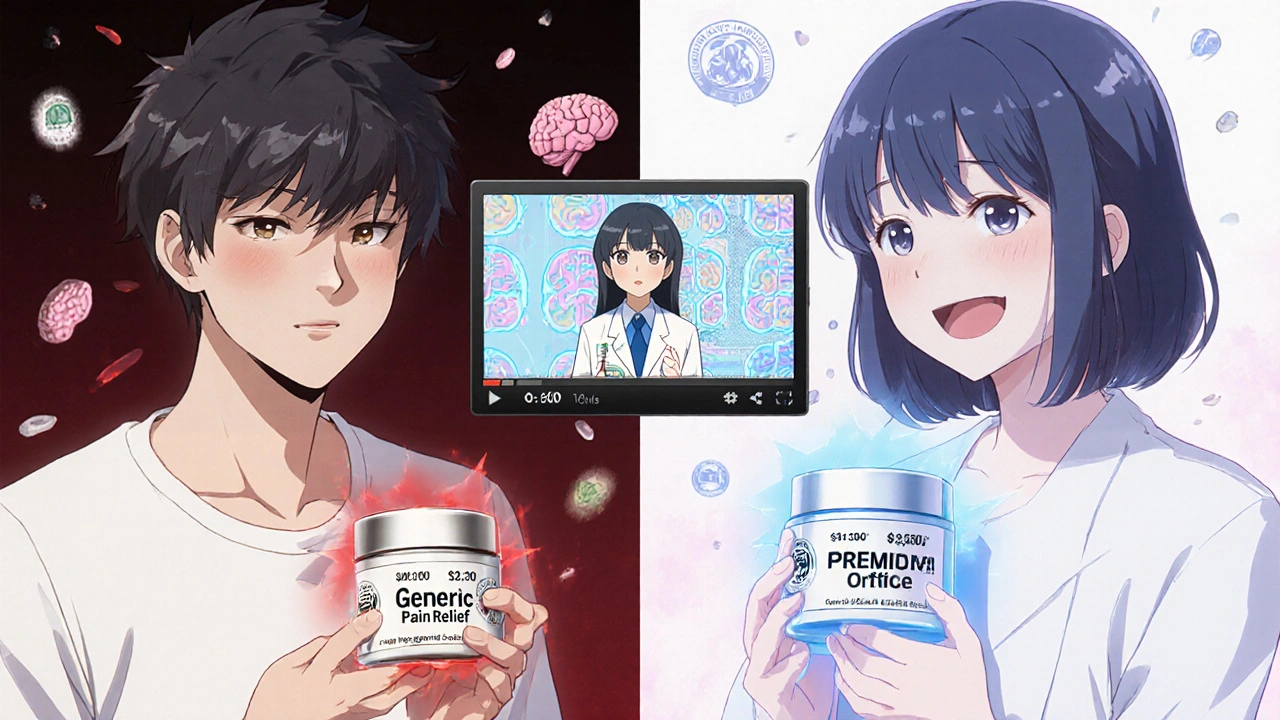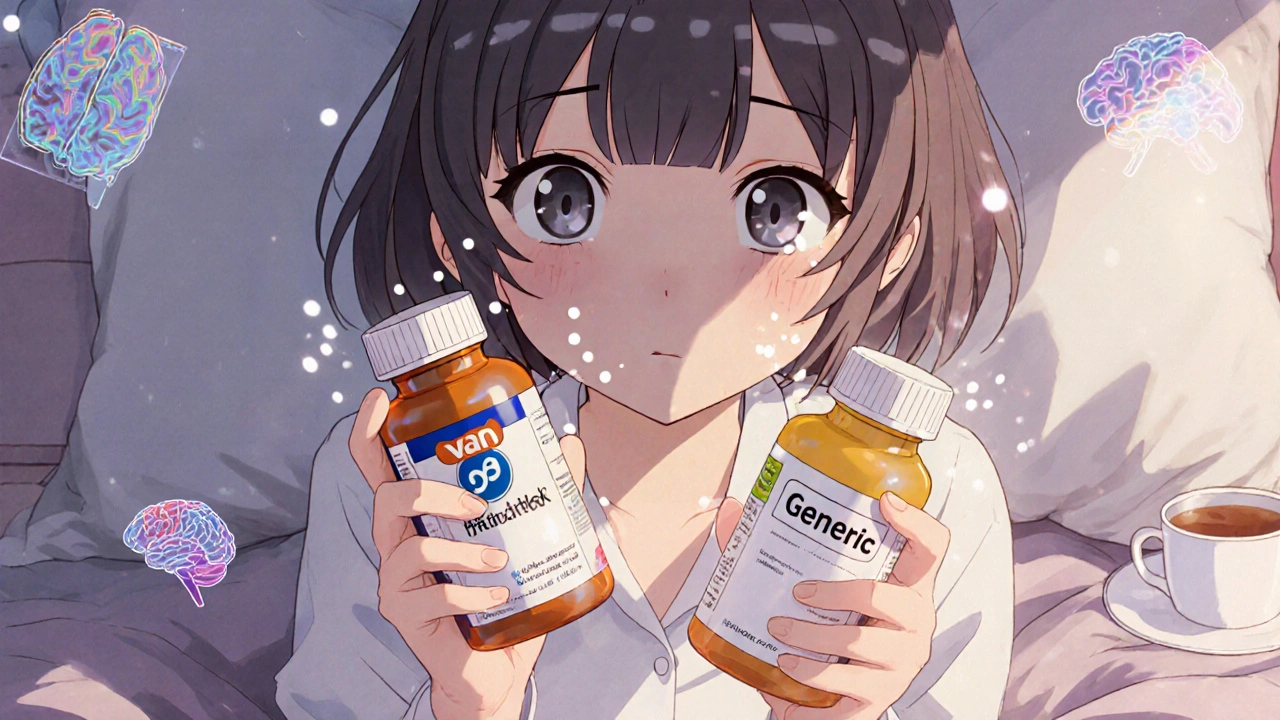When you pick up a prescription, do you ever wonder why some people say their generic medication just doesn’t work as well as the brand name-even though the active ingredient is exactly the same? It’s not just in their head. It’s in their perception.
What’s Really Happening When You Take a Generic?
Generic drugs are required by the FDA to contain the same active ingredient, in the same strength, and work the same way as their brand-name counterparts. The difference? Packaging, color, shape, and price. But here’s the twist: those tiny differences change how your brain responds. A 2016 study gave people identical placebo pills-no medicine at all-and labeled one group’s as "Nurofen," the other as "Generic Ibuprofen." The group that thought they were taking Nurofen reported just as much pain relief as people who took real ibuprofen. The generic-labeled group? Their pain barely budged. The pills were the same. The outcome wasn’t. This isn’t magic. It’s biology. Your brain has a built-in expectation system. When you see a familiar brand logo, your prefrontal cortex lights up-same area that handles belief, reward, and pain control. That activation triggers real chemical changes: more endorphins, less pain signaling. The same thing happens in reverse. If you think a drug is cheap or "inferior," your brain can actually amplify discomfort. That’s the nocebo effect-the dark twin of the placebo effect.Price Doesn’t Just Affect Your Wallet-It Affects Your Pain
In one striking experiment, researchers gave volunteers identical pain-relief creams. One group was told it cost $2.50 per dose. The other was told it cost $0.10. Both creams were pure placebo. The expensive group reported pain levels nearly double that of the cheap group. And here’s the kicker: brain scans showed their spinal cords were actually sending stronger pain signals. Their bodies weren’t imagining it-they were experiencing more pain because they believed they were getting a lower-quality product. This isn’t just about pain. In statin trials, patients taking sugar pills reported muscle pain at rates ranging from 0.2% to 2.7%-a 13-fold difference-despite no active drug being present. Why? Because they’d been told statins cause muscle pain. So they started noticing every little twinge. Their attention turned into symptoms.Why Do Generics Get a Bad Reputation?
It’s not that generics are less effective. It’s that we’ve been conditioned to think they are. A 2022 Consumer Reports survey found 63% of Americans believe brand-name drugs are superior. Even more telling: 41% said they have less confidence in generics’ effectiveness. That’s not based on science. It’s based on marketing, packaging, and stories passed down like folklore. Pharmaceutical companies know this. That’s why you now see "premium generics"-same pills, but with sleeker packaging, branded names like "Advil Migraine," and color schemes designed to feel trustworthy. Teva’s branded generic version of ibuprofen captures 17% of the migraine market, even though it’s chemically identical to the $2 bottle next to it. Meanwhile, in clinics, patients often say things like, "My old brand worked fine, but this generic? It doesn’t do anything." When doctors check blood levels, the drug concentration is spot-on. The problem isn’t chemistry. It’s cognition.
What Happens in the Brain When You Switch to a Generic?
Functional MRI studies show that when patients believe they’re taking a brand-name drug, areas of the brain tied to expectation-like the dorsomedial prefrontal cortex and anterior insula-show 22-35% more activity than when they think they’re taking a generic. That heightened activity isn’t just mental noise. It directly influences how the body responds to treatment. In depression, up to 40% of the benefit from antidepressants comes from the placebo effect. If you don’t believe your generic fluoxetine will help, your brain may not release the serotonin pathways it normally would. The drug is there. But without the psychological trigger, the effect dims. Even in heart conditions, where outcomes are more objective-blood pressure, cholesterol, heart rate-the perception gap still matters. One study found patients on plain generic beta-blockers had slightly higher anxiety than those on branded versions. Not because the drug was weaker. Because they felt less secure.How Doctors Can Fix This
The good news? You can fix this. It doesn’t require new drugs. Just better conversations. A 2020 JAMA study showed that when doctors spend just two to three extra minutes explaining that generics are required to meet the same strict standards as brand-name drugs, patient adherence jumps by 18-22%. That’s not a small thing. It means fewer hospital visits, fewer relapses, lower costs. Effective phrases? Avoid saying "just a generic." Instead, say:- "This is the exact same medicine as the brand, approved by the FDA. The only difference is the price."
- "Over 90% of prescriptions in the U.S. are generics. They work just as well for millions of people."
- "If you’ve had side effects before, let’s talk about what might be real-and what might be your brain reacting to the label."

What Patients Can Do
If you’ve switched to a generic and feel like it’s not working, pause before you call your doctor. Ask yourself:- Did I notice a change right after the switch-or did I start expecting it to fail?
- Am I paying more attention to every little sensation because I think this version is "lesser"?
- Have I read stories online about generics "not working"? That’s not data-that’s confirmation bias.
The Real Cost of Mistrust
This isn’t just about feeling better. It’s about money. And lives. In the U.S., poor adherence to generic medications costs the healthcare system $28 billion a year. That’s from extra doctor visits, ER trips, and hospitalizations-all because people stopped taking pills they thought didn’t work. Patients are 27% more likely to quit taking a generic antidepressant within 30 days than a brand-name one-even though the drug is identical. That’s not a failure of medicine. It’s a failure of perception. And here’s the irony: the more we push generics to save money, the more we risk undermining their effectiveness by failing to manage expectations. We’re trying to fix the system, but ignoring the mind.What’s Next?
The FDA’s 2023 draft guidance now advises doctors to avoid phrases like "just a generic" and to emphasize equivalence. The European Medicines Agency has started standardizing generic packaging across countries to reduce confusion. Companies like Aurobindo are testing "expectation-optimized" designs-blue and white packaging, clean fonts-that signal trust without misleading. Future research is looking at personalized approaches: could we screen patients for suggestibility? Could neuroimaging help identify who’s most likely to benefit from perception-based support? That’s still experimental. But the direction is clear. The truth is, medicine doesn’t just live in pills. It lives in expectations. In trust. In the quiet belief that something will work. Generics aren’t second-rate. They’re science-made affordable. But if we don’t fix how we talk about them, we’ll keep treating patients like they’re broken-not because the drug failed, but because their mind did.Do generic drugs work as well as brand-name drugs?
Yes. By law, generic drugs must contain the same active ingredient, in the same strength, and deliver the same therapeutic effect as the brand-name version. The FDA requires generics to be bioequivalent-meaning they’re absorbed into the body at the same rate and to the same extent. Studies show no meaningful difference in effectiveness for over 90% of generic prescriptions. The only differences are in inactive ingredients like color, shape, or filler-none of which affect how the drug works.
Why do some people feel generics don’t work?
It’s often due to perception, not chemistry. If you believe a brand-name drug is better, your brain expects it to work-and that expectation can trigger real biological changes, like increased endorphin release or reduced pain signaling. When you switch to a generic, even if it’s identical, your brain may lower its expectations, reducing the placebo effect. This is especially strong in conditions like depression, chronic pain, and anxiety, where up to 40% of the benefit comes from psychological factors. Negative stories, price cues, and unfamiliar packaging can all trigger the nocebo effect-making you feel worse even when the drug is working fine.
Can the placebo effect be stronger with brand-name drugs?
Yes. Multiple studies show brand-name labeling increases the placebo effect by 30-40% compared to identical generics. In one study, placebo pills labeled as "Nurofen" provided the same pain relief as real ibuprofen. The same pills labeled as "Generic Ibuprofen" offered significantly less relief. Brain scans confirm that brand-name labels activate expectation-related regions like the prefrontal cortex more strongly. This effect is strongest in pain, anxiety, and depression-and weakest in conditions like high blood pressure where outcomes are more objective.
Does the price of a drug affect how well it works?
Surprisingly, yes-even when it’s a placebo. In experiments, people who thought they were using an expensive cream reported nearly double the pain compared to those using the exact same cream labeled as cheap. Brain and spinal cord scans confirmed they were experiencing more physical pain signals. This isn’t about the drug-it’s about the belief that expensive = better. Conversely, telling patients a generic is "low-cost" can trigger nocebo effects, increasing reported side effects by 25-40%. Avoid mentioning price unless necessary.
Should I avoid generics to get better results?
No. Generics are just as effective as brand-name drugs for the vast majority of people. Avoiding them because you think they’re inferior can cost you money and health. Instead, talk to your doctor or pharmacist. Ask them to explain why the generic is safe and equivalent. If you’ve had a bad experience, consider whether it was the drug-or your expectations. In many cases, simply understanding how perception affects outcomes can improve your results-even if you stay on the same generic.
Can packaging or branding improve how generics work?
Packaging alone doesn’t improve effectiveness-but it can reduce fear. One study found that adding a simple line like "FDA-approved equivalent to [Brand Name]" to generic packaging increased patient confidence by 34% and improved adherence by 19%. Some companies now use trusted color schemes (blue and white) and clean designs to signal reliability without deception. But simply making generics look "premium" doesn’t guarantee better outcomes. The key is honest communication, not marketing tricks.
If you’ve ever felt your generic medication didn’t work as well, you’re not alone. But you’re not broken either. The medicine is fine. The system just hasn’t caught up with how powerful your mind is. Start with a conversation. Then give it time. Your body might just need a little more trust to do its job.

Manjistha Roy
November 21, 2025 AT 15:44It’s fascinating how much our brains shape our experience of medicine. I’ve seen patients swear their generic blood pressure med isn’t working-only to find their levels are perfect. The real issue? They’ve been told generics are "inferior" since they were kids. We need to reframe this as a cognitive health issue, not a pharmaceutical one.
Jennifer Skolney
November 22, 2025 AT 22:07I switched my anxiety med to generic last year and felt like it wasn’t doing anything… until I read this. Turns out I was convinced it wouldn’t work because it looked different and cost less. I gave it another shot with a new mindset-and wow. It’s been months and I haven’t had a panic attack. Mind = blown. 😊
JD Mette
November 24, 2025 AT 13:06This is one of those topics where science and perception collide in such a quiet, powerful way. I’ve worked in clinics for over a decade and have seen this exact pattern over and over. Patients don’t need more drugs-they need better context. The fact that a simple explanation can boost adherence by 20%? That’s not just helpful. It’s transformative.
Olanrewaju Jeph
November 25, 2025 AT 19:30Let me be clear: the biological equivalence of generics is not a matter of opinion-it is a regulatory fact. The FDA mandates bioequivalence within an 80–125% confidence interval for absorption rates. Any perceived difference is psychosomatic, not pharmacological. The nocebo effect is well-documented in peer-reviewed literature, and it is not a weakness of the patient-it is a failure of communication by providers and marketers alike.
Dalton Adams
November 27, 2025 AT 14:04Look, I’ve read every meta-analysis on this. The placebo effect in antidepressants is statistically significant, yes-but it’s also wildly overblown in pop science. You think people are just "believing" their meds work? No. They’re responding to neurochemical modulation that’s amplified by expectation. But here’s the kicker: the same brain regions activated by brand-name labeling are also hijacked by marketing. So when you say "Teva’s packaging increases trust," you’re really saying Big Pharma has figured out how to weaponize psychology. And we’re letting them.
Also, did you know that in the EU, generic packaging is standardized to reduce this exact confusion? The U.S. still lets companies design generics to look like luxury items. That’s not innovation. That’s exploitation.
And don’t get me started on the 27% dropout rate for generic antidepressants. That’s not patient noncompliance-that’s systemic deception.
Stop calling it a "perception problem." Call it what it is: a failure of medical ethics.
Kane Ren
November 28, 2025 AT 00:25I used to think generics were second-rate too-until I gave mine a real chance. I stopped obsessing over the label and started tracking my actual symptoms. Turns out, I felt better. Not because the drug changed. Because I did. It’s wild how much your mindset can shift your reality. You don’t need a fancy brand. You just need to believe in the science-and yourself.
Charmaine Barcelon
November 29, 2025 AT 08:19People are so gullible. They think their brain is making them feel worse-but really, they’re just lazy. If you don’t want to pay for brand-name, then deal with it. Stop blaming your mind. Just take the pill.
Karla Morales
November 29, 2025 AT 19:59📊 Data-driven breakdown: The placebo effect contributes 30–40% of therapeutic outcomes in pain, depression, and anxiety. The nocebo effect increases perceived side effects by 25–40% in generics. FDA bioequivalence thresholds: 80–125% AUC and Cmax. Adherence increases 18–22% with clinician education. Cost savings: $28B/year in U.S. healthcare. The problem isn’t the drug. It’s the narrative. And narratives are controlled by institutions, not individuals. Time to audit the messaging.
Javier Rain
December 1, 2025 AT 16:41This is the kind of post that makes you rethink everything. I used to be one of those people who refused generics-until I started reading the science. Now I tell everyone I know: "It’s the same medicine. Your brain just needs to catch up." And honestly? The fact that we can fix this with better conversations instead of new drugs? That’s hope. That’s power. That’s medicine done right.
Keep pushing this message. The system needs it.